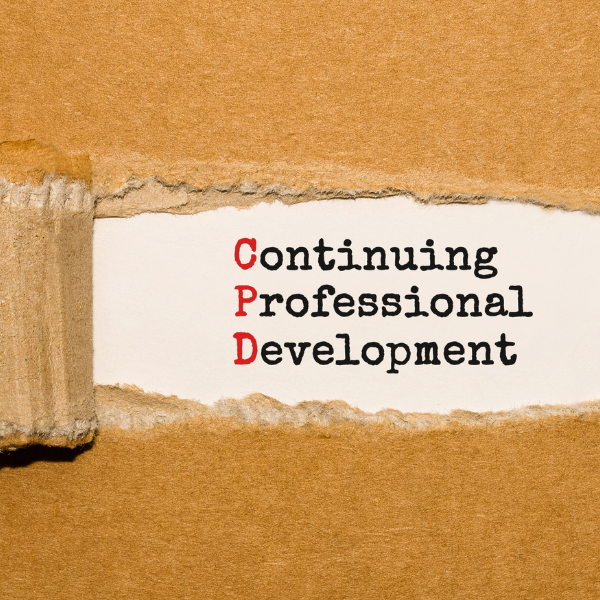All Things Admin Joins ASAP. Learn More ›
How to Level Up Your Learning
December 3, 2024

Want to supercharge your learning and career development opportunities? Start with these tips.
Recorded at SHRM 2024 and produced by the American Society of Administrative Professionals - ASAP. Learn more and submit a listener question at asaporg.com/podcast.
Download this episode for later and make sure to leave us a 5-star review on Spotify and Apple Podcasts!
Transcript
[music playing]
Leah Warwick: Hi, everyone. I'm Leah Warwick, and you're listening to "The Admin Edge." We went to the HR event SHRM and heard from HR professionals, executives, and trainers about how they view admin professionals, and what skills they think are needed for advancement. One very interesting person we talked to about how to level up your learning is Dr. Ted Sun. Ted is the Chief Innovations Officer and President of Transcontinental University. First, I asked Ted how an admin or EA can frame their request for professional development training.
00:00:43
Dr. Ted Sun: So, in order to justify any kind of expenditure of resources with an executive level, you have to show them ROI. ROI, with any kind of executive, is looking at exactly what the problem is. This is not a case study of any kind. So many people use case studies. It's like: What does it mean? Is it practical? And in the real world, nobody hands you a problem on a piece of paper, so the first skill you have to really get a good handle on is: How do I identify the problem in a quantifiable way for the executive so that they know: Hey, if I solve this problem, here's how much time it's going to save me. Here's how many problems it'll save me.
So, if you go to an executive, for example, and say, "Hey, I saw that your schedule is like this and you constantly have to change your schedule because problems continually happen in your company. If I took this course on problem prevention, I can reduce your problems by 25%, which means you will have five more hours a week extra back to your schedule that you had actually scheduled, and you don't have to reschedule things and keep on pushing things back." If they have a family, you relate that back to the family. "You can have five more quality hours with your children." Those become extremely important, tangible metrics that you can help the executive understand, "This is the return on investment if you help me take this course."
00:01:58
Now, taking the course is a little bit of a challenge because most organizations don't have a learning system. They have courses. They push information at you. You get a certificate. You're done. When I say a "learning system," there has to be a circular model where I'm going to go learn this piece of information, I'm going to apply it, I'm going to create metrics to make sure I'm learning and how I'm improving over time, and then do it again over and over until it becomes a quantifiable skillset.
You have to go through the same loop over and over again and you have to help organizations – or you can design it for yourself, in your own family life, in your own personal life first, and then do it on the organizational level afterwards. So, the content of the learning doesn't have to be expensive, and that's the beauty of it. You can read certain chapters of a book – like I tell people all the time, "Don't read a book – unless you want it for entertainment. Great. If you want to learn something, don't read a book because you won't retain it. Read two or three pages of knowledge, go apply that knowledge over the next week over and over again, see what works, what doesn't work. Different relationships may have different ways of applying it. Then read another two or three chapters."
00:02:57
A good book should take you two or three years to read. So, the content of what you're learning is really easy to obtain, but it's the learning system and how you learn it. If you want to make sure you have safe environment, you have to tell people that, "Hey, I'm learning this. This is an experiment for me, so give me feedback. Don't fry me if I make a mistake because this is a learning experience." So, you need to create that safe environment so that you can apply and practice something completely brand new.
Leah Warwick: Do you have any thoughts on implementing something organizationally? That's kind of why we're here at SHRM. HR, when they look at their training and development, how do they templatize it? How do they standardize it? What do you think about that, about systemizing this kind of thing?
Dr. Ted Sun: Yeah, definitely you get scalability when it comes to systematizing it across the board, but somebody has to take the lead in that. Whoever has the idea, that has the communication with that executive and that executive supports it and is like: Great. I want to be your guinea pig. What if we can replicate the successes that we've done through this program? Let's do it for all the assistants, all the execs and so on, and just expand that out over time. This doesn't have to just stop at the executive assistants or assistant level; this can grow to the rest of the company, because a learning system is really what we're after, making sure everybody is learning, so everybody's winning and everybody's getting better.
00:04:16
That executive assistant can be the guinea pig that pioneers the entire pathway, which very easily goes into the next step in their career. You have to be active in your learning, but the active learning you have to measure on the back end. People think, if I try it, then I'm going to learn it. Not always, because if you don't attach a memory and emotional content to that piece of information – how the brain works in very simple ways. You learn one new piece of information. Let's say it's the number five. I may use it for, oh, my hotel room is number five. I'll remember. My address is number five. I'll remember. Unless you put a measurement, an emotional attachment to that number five, it's not going to mean anything.
00:04:55
So if I say, "Okay, that number five means if you get your significant other five gifts, they will love you forever," you attach some type of emotional content. That's where the measurement comes in. Whatever you're learning, apply it. Once you apply it, measure the outcome. When you measure the outcome, then you have the emotion that, "Oh, that really sucked. Oh, that really hurt." Or, "Oh, that was really great. That helped me build a better relationship. That built me trust." Whatever that emotional content is, that'll tell your brain to take that information and attach that emotion, and then it becomes more permanent knowledge that you can recall on a regular basis, whenever you need it.
[music playing]
Leah Warwick: Now I ask Ted a submitted listener question from our administrative professional community.
"What are your thoughts about the best way to change the perception of administrative professionals? We are still viewed as support functions, even though the day-to-day jobs of many senior-level EAs overlap with the works of chief of staff. We operate with significant presence in the C-suite that is unmatched by any other position in corporate America. I think we need to start by reclassifying our positions and elevating it to something more significant." What are your thoughts on that?
00:06:03
Dr. Ted Sun: So I think one of the major issues is the self-promotional branding of the profession as a whole, but this can't happen at the group level as a starting point. Somebody has to learn how to brand themselves, so when they achieved XYZ, when they were part of a strategic decision, they have to – the organization is not going to do it – figure out a way to brand themselves as the experts.
What I tell people all the time [is] sometimes it's two key skills you have to make sure you have. One is systems thinking, so you understand how to see the system that's happening, prevent problems before it starts happening, and get the executive to recognize you on that. The second one is Supratik methods: the art of asking the right questions.
00:06:49
With many executives, as most of the audience knows, they have egos (and some are bigger than others) and you can't tell them, "Go this way." So, learning how to ask the right questions and leading the executive there time and time again is the strategic approach to advise upwards. I authored a book a while back on advising upwards, and it had so much to do with asking the right questions. If you learn to ask the right questions, you lead people there, and sooner or later there's the, "Oh, what would my assistant ask me?" They start thinking in that way and it's like, oh, now they get recognized. Learning how to brand yourself, having those two skills are going to be key to driving the industry forward.
Leah Warwick: Yes! Oh, I love that answer because systems thinking is something I've been thinking about a lot lately, too. It's becoming more of something that people know about. It's been around for a long time, but I think it's seeping into more industries and more roles needing to have that understanding.
00:07:46
Dr. Ted Sun: Yeah, I think that the idea is there, but most people don't have a clue what it is. I ask people all the time like, "How many problem-solvers do you have in the company?" "Oh, we have problem-solvers." You see "problem-solver" on résumés on every aspect. And then I ask them, "Great. How many problem-preventers do you have? Do you know how much it costs you to have a lot of problem-solvers? What do problem-solvers need? They need problems. They sit around and wait for problems to happen, right?" You have all these problem-solvers? Great. It's already costing you a whole bunch of money. Get problem-preventers. That's going to be the key solution.
To prevent a problem, you have to see the system of different influences into a situation, and that's what you have to lay out. Draw diagrams. Mind mapping. There's all these different techniques to doing it, and most executives don't have time to do that. That's half the challenge, making sure they have time.
The very strategic role that an assistant can play is, hey, I'm going to block out half an hour so this executive can take time to reflect, take time to learn. Help that executive create the space to learn, and let that executive grow. That's going to be such an incredibly powerful step to making sure that executive will recognize you.
00:08:59
One of the biggest, powerful emotional hooks that an assistant can do for any individual is show them how you help them grow. All the money and all the things, the time, that changes from time to time, but if you show them, help people know that I'm the one that helped you grow, they will love you and respect you to no end. And that's the relationship you want to start developing. Your job is not simply to assist them and learn things, but you're going to guide them in learning and growing.
Leah Warwick: And so if you are also, in a sense, investing in your exec, for example, like, "I want to help you grow," the best-case example is if they turn around and do the same thing for their assistants and be like, "I want to help you grow, so I'm going to invest in you as well." If you're both investing in each other, then the relationship is going to be very strong.
00:09:46
Dr. Ted Sun: Many people forget a basic human psychological trigger: give what you want. If you want more training, more time to learn training, help that executive create the time for learning and development and then they'll understand: "Oh, you've given me the gift of learning; therefore, I need to reciprocate." The whole concept of reciprocating is wired into our intrinsic wiring for our brain. Like when somebody gives you a gift, you almost feel like: Well, what did I do to deserve it? Or what do I do to give back? And if you do it two or three times, I definitely have to give back to you something. Normal people would do that. So, apply that. Help that executive learn. They will, in return, give you something back to give you resources and time to learn as well.
Leah Warwick: Give what you want. I'm going to use that one. I'm going to take that one and use it in my personal life; I really like that. Well, thank you. This was a great conversation. I really appreciate it.
Dr. Ted Sun: I'm happy to be here.
[music playing]
00:10:38
Leah Warwick: Thank you for listening to "The Admin Edge," produced by the American Society of Administrative Professionals. Original music and audio editing by Warwick Productions, with audio and video production at SHRM by 5Tool Productions. If you liked this podcast, please leave us a nice review, five stars, and subscribe. If you'd like to submit a listener question, you may do so on our website at asaporg.com/podcast.











